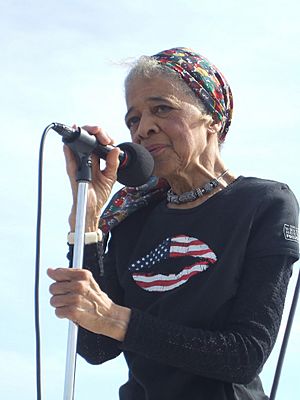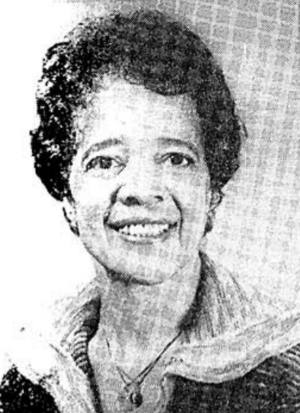Vel Phillips facts for kids
Quick facts for kids
Vel Phillips
|
|
|---|---|

Phillips at March on Milwaukee in 2007
|
|
| 29th Secretary of State of Wisconsin | |
| In office January 3, 1979 – January 3, 1983 |
|
| Governor | Lee S. Dreyfus |
| Preceded by | Doug La Follette |
| Succeeded by | Doug La Follette |
| Personal details | |
| Born |
Velvalea Hortense Rodgers
February 18, 1924 Milwaukee, Wisconsin, U.S. |
| Died | April 17, 2018 (aged 94) Milwaukee, Wisconsin, U.S. |
| Political party | Democratic |
| Alma mater | Howard University University of Wisconsin–Madison Law School |
Velvalea Hortense Rodgers "Vel" Phillips (February 18, 1924 – April 17, 2018) was an amazing American lawyer, politician, and civil rights leader. She made history many times, breaking barriers for African American women in Wisconsin.
Vel Phillips was the first African American woman to graduate from the University of Wisconsin Law School. She was also the first African American and the first woman elected to the Milwaukee Common Council. Later, she became the first African American and first woman to serve as a judge in Wisconsin.
Vel Phillips' Early Life
Vel Phillips was born on February 18, 1924. She had two siblings, Thelma and Russel. Her father owned a restaurant and worked as a cook. Her mother, Thelma, had three important rules for her children: no smoking, no drinking, and no talking loudly.
When Vel was in high school, she won a speaking contest. The prize was a scholarship to any college she chose. She picked Howard University in Washington D.C.
A big moment in her life happened when she was in college. She was at church with white friends, but ushers made her leave. At that time, Washington D.C. was segregated, meaning Black people were not allowed in certain places. This experience made her feel strongly that things were "not as they should be."
After college, Vel returned to Milwaukee and volunteered for the NAACP. This is where she met Dale Phillips. They got married and went to law school together in Madison. They were the first African American couple to graduate from the University of Wisconsin Law School.
Vel Phillips' Career
In 1953, Vel Phillips ran for a spot on the Milwaukee Public Schools board. She was the first Black candidate to get past the first election round.
In 1956, Vel Phillips made history again. She became the first woman and the first African American person elected to the Milwaukee Common Council. This group makes laws for the city. Council members were called "Alderman," so she was called "Madam Alderman." For many years, she was the only woman and only Black person on the council.
During the 1960s, Vel Phillips often took part in peaceful civil rights protests. These protests fought against unfair treatment in housing, schools, and jobs. In 1962, she suggested a law to stop housing discrimination. This law was finally passed in 1968, after a national law was approved.
Vel Phillips was even arrested at a rally in 1967. She was the only city official arrested during that time. This brought more national attention to Milwaukee's civil rights issues.
She also helped baseball star Hank Aaron learn about civil rights. She showed him how he could help the movement.
In 1971, Vel Phillips resigned from the Common Council. She was appointed as a judge, becoming the first female judge in Milwaukee County. She was also the first African American judge in Wisconsin.
After her time as a judge, she taught at several universities.
In 1978, Vel Phillips made history once more. She was elected as Wisconsin's Secretary of State. This made her the first woman and first non-white person to hold this important state office. When both the Governor and Lieutenant Governor were away, she briefly served as Acting Governor. She joked that "the men hurried back" when they realized a woman was in charge!
Vel Phillips was also the first Black person elected to the National Committee of a major U.S. political party.
Active Retirement
After leaving her state office, Vel Phillips stayed very active in her community. She served on the boards of the Wisconsin Conservatory of Music and America's Black Holocaust Museum.
In 2002, she became a "Distinguished Professor of Law" at Marquette University. She also helped Gwen Moore win her campaign to become Wisconsin's first African-American woman in the U.S. House of Representatives.
Vel Phillips also served on the board of the Vel Phillips Foundation. This charitable group was started in 2006. Its goal is to help create equality and opportunities for minorities. It focuses on social justice, education, fair housing, and jobs.
In 2011, the University of Wisconsin–Madison renamed one of its student dorms after her. In 2014, she received a special award from the Wisconsin Alumni Association.
Death and Legacy
Vel Phillips passed away in Milwaukee, Wisconsin, on April 17, 2018.
Her legacy continues to be honored. On August 7, 2018, a street in Milwaukee was renamed Vel R. Phillips Avenue. In 2021, a high school in Madison was renamed Vel Phillips Memorial High School.
Also in 2021, it was decided that a statue of Vel Phillips would be placed on the Wisconsin State Capitol grounds. This honors her important contributions to Wisconsin and the civil rights movement.
See also
- List of African-American jurists
- List of first women lawyers and judges in Wisconsin


